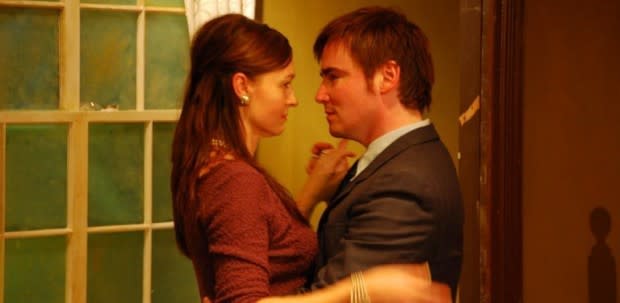Review: Defunkt Theatre's The Homecoming

The mysterious Ruth (Grace Carter) dances with her husband's brother, Lenny (Matthew Kern). But who's seducing who?
Defunkt Theatre’s production of “The Homecoming” is chock full of staring. Characters stare at each other with the freezing acid of a snake and the blustering rage of a rhino. They stare at each other with ravenous hunger for sex and comfort. And they stare like they can stare onto stage all the answers and emotions left so ambiguous by Harold Pinter’s Tony-winning script, which, like many of his other works, is stuffed fat with silences and ambiguities. Unfortunately, the staring in Defunkt’s production, like much of the acting, so overly fills the small Backdoor Theater that it overwhelms the ambiguity, playing up the family’s psychosexual power play while weakening the script’s already tenuous accessibility.
Pinter’s perverse play shook critics and audience alike during its 1965 premiere. It opens in a rundown home in North London, where an aging patriarch, Max (Blaine Palmer), struggles to maintain alpha status against his cold, sarcastic son, Lenny (Matthew Kern), while continuing to push around Lenny’s simple-minded brother, Joey (David Bellis-Squires), as well as his own long-suffering brother, Sam (William Wilson). The four exist in a tortured power play of masculinity, each trying to top the other, with Max especially embattled between his position as questioned father (it’s hinted that perhaps they aren’t his sons) and, given his roll as family cook, as an emasculated stand in for his deceased wife, whom he alternately recalls with love as the backbone of the family and with hatred as a whore.
Into this pit of vipers steps the long absent eldest son, Teddy (played by Zachary Rouse with a relentless Cheshire Cat grin that speaks more of wanting to devour than of mirth), who ran off to America to become a professor and now returns home after seven years with an attractive wife, Ruth (Grace Carter) and word that he has three boys. The pair’s marriage is questionable—a restless Ruth wants space while Teddy insists she rest—and then questioned, as Max accuses her of being a prostitute upon first meeting her. Quickly, Ruth slides into the family’s predatory games, both as the hunter and the hunted, commanding the men but also giving into their wants. Almost every line drips with alternate meaning, fakeness seeping through any feigned sentimentality, sadism behind any demand, leaving us to question who’s seducing whom, and who's torturing whom, as we wait for the final shoe to drop.
The play leaves the audience with more questions than it answers. It was originally criticized for being emotionless—that is, none of the characters seem to have emotional motivation for their actions and inactions, leaving us to wonder why, say, Teddy just stands by silently while his brothers ravish his wife, but then doesn’t even bring it up when Lenny gets mad at him for stealing a cheese roll. And little in this production answers those questions.
Ruth in particular is troubling. Carter plays her with the slow, intentional cadence of a psychic medium coming to terms with the future, which partially gives the sense that Ruth is just now figuring her own self out, potentially after some sort of traumatic breakdown, or at least existential malaise (Teddy keeps saying, “she’s not well”). But her long fake eyelashes prevent us from seeing her eyes, and if the eyes are the window to the soul, then it leaves her somewhat soulless, weakening the act of self-revelation and leaving in its place haughtiness.
Under Paul Angelo’s direction, the cast ably captures the black comedy of the script. Kern’s droll, acid-eyed, effeminately mod portrayal of Lenny especially garners laughs as he slithers like a snake over the stupidity of his male relatives. And the small theater space with its excellent realist thrift store set by Bill Tripp palpably captures the claustrophobia of the play.
But for the most part, the cast overplays the drama, the attacks, and the pregnancies of the pauses, spoiling the ambiguities and exhausting the audience, so that when the true eruptions occur, they no longer stand out. Palmer in particular plays Max’s outbursts with such over-the-top bluster that I found myself more annoyed by his final outburst than affected. The unfortunate result is that, instead of pulling us into the story with the smattering of universal acts—the squabbles over who’s doing the dishes, the jostling for a parent’s attention—and therefore implicating us into its deeper conflict, the character’s are so sheerly sadistic and across the board unhuman in their behavior that I found myself unable to empathize. The show left me seriously disturbed—as it should—but in a cold, unfeeling way.
As the New York Times theater critic Ben Brantley said in his review of the play’s 2007 revival, “Playing Pinter requires repressing the urge to act actively.” The strength of the production should be in the intimacy of Back Door's small space, where the slightest twitch or glimpse can communicate so much. But instead, it feels like we’re being stared at with such intensity that we lose track of what the staring’s all about.
Defunkt Theatre's The Homecoming continues at Back Door Theater through November 17. Tickets and further info are available here.




